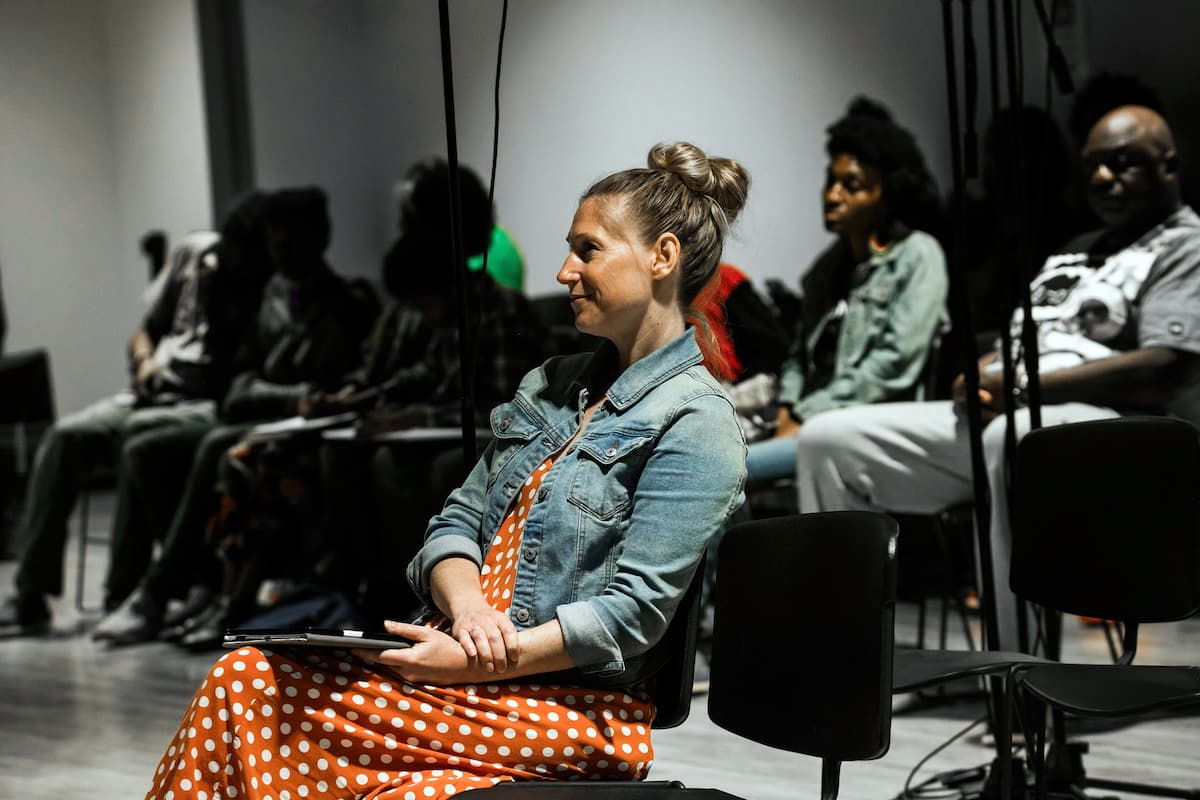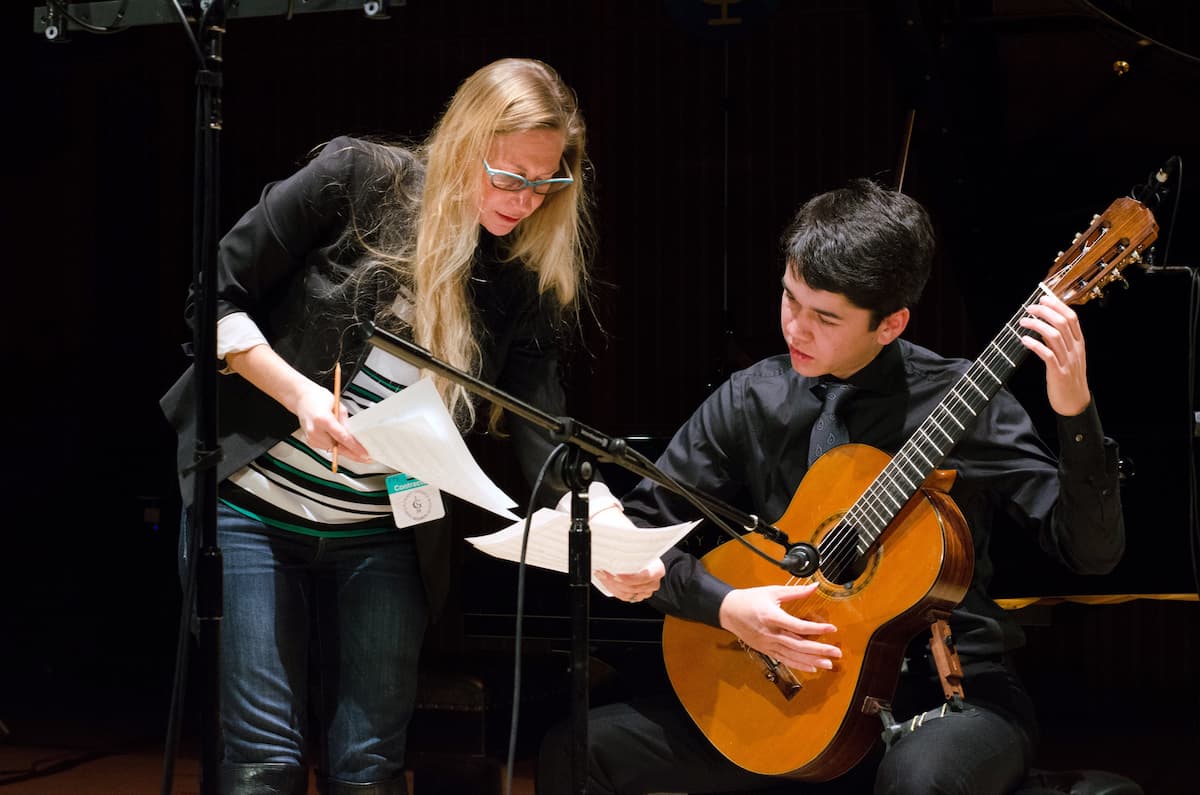From the Top (FTT) is America’s largest platform celebrating young, classically trained musicians. It is a National Public Radio program in the United States, and it has been on for over 24 years. In this interview, Megan Swan, the Director of From the Top, will tell us more about this program.

Megan Swan © Qu West
Hello Megan! Thank you for accepting the interview and for letting us know about From the Top. From the Top has been an ongoing radio program since the 1990s. Would you briefly tell us about the radio program?
Thank you so much for your interest in From the Top! The NPR (National Public Radio) radio program began almost 25 years ago (next year we’ll celebrate our official anniversary!) and had, to me, a simple and incredible mission: celebrate young classically trained musicians as loudly and widely as athletes. As a musician myself (just too old to have applied to FTT) and a trumpet player at that (loud is not a bad word in my book!), hearing this description of the seed for the radio show immediately resonated. (Although, kudos to my high school band director, Kevin Miller, who built a program so strong that football game stands were filled 90% with fans of the marching band. Go Music Education Go!)
Before April 2020, From the Top was recorded in front of a live audience – very apropos to the most popular NPR artistic media at the time. Young musicians, ages 8-18, who seemed like hidden gems to audiences not already tuned into this vibrant world, would perform a piece on-stage with a host or guests and participate in an interview or sometimes a skit. The show traveled 12-15 times a season to theaters, auditoriums, and festivals across the US, and even internationally once or twice, and was edited and distributed to NPR stations. For the many alumni I have spoken to, there was no experience like it, and being on From the Top ranks high in their fondest memories!
As you might imagine, there was a moment of panic when airports closed, and all things ground to a halt in March of 2020 (our production team barely made it back to their respective homes as we left Los Angeles from what would be our last live-to-tape production). However, FTT, an organization staffed by dedicated and creative over-achievers (Go Music Education! Most of our staff studied music and/or theater seriously at some point), did not stop producing media amplifying the voices of young musicians. We sent “blanket forts,” recording studios in a box equipped with heavy blankets to dampen rooms when necessary, and captured performances and interviews from young peoples’ homes remotely until, slowly but surely, we were able to start meeting in recording studios to work in person again.
This major shift in format, born from necessity, illuminated where FTT could make an even larger impact in young musicians’ journey: providing a professional recording session experience. For many of the young musicians on the show (whom we now call From the Top Learning and Media Lab Fellows), this is their first time recording in a studio with a music producer, sound engineer, and professional musicians (our host, pianist Peter Dugan, or frequent guest host Orli Shaham, and a bevy of out-of-this-world guest artists), learning hands-on about the microphones being set to capture their sound, and recording in a session performing multiple takes (not just full takes like for auditions – “punches” of smaller sections, too), and making decisions on where to take risks. They truly get to take the lead in recording at the professional level. The interview (which we call a conversation) portion of the show also evolved in this new style. The conversations you hear on the airwaves are a piece of what is recorded in the studio. Our goal is to give space and agency to our Fellows to speak about music, their lives, and what they find important in the world, so each recorded conversation is 30 minutes or so in the studio. For audience members who are looking to hear a more complete version of Fellow’s interviews, we post the longer versions on the FTT Podcast (found on all major podcast platforms) and on our website.

Megan Swan © From the Top
As I write this, I realize that for me, and I dare say many of my colleagues, the radio show is, yes, an awesome weekly broadcast that is a joy to create and send out to nearly 200 radio stations; but really is an instrument to give megaphones, new skillsets and a network to astonishing young people who will undoubtedly change our world (not just the arts…truly, humanity) for the better.
Sam Cooke’s “A Change Is Gonna Come,” arranged by Matt Jones
Performed by From the Top Alum and three-time Grammy® Award-winning artist Kevin Olusola and fellow alums Clifton Williams and Hannah White.
You are the program director. How long have you held this position? What do you usually do in it?
I have been with From the Top for almost 5 years, beginning in August of 2019, and I can honestly say this is the most rewarding work I’ve ever been able to do (to me, that says a lot because I did not feel lacking in the myriad positions and projects I worked on prior!).
My role encompasses different areas: working closely with the Admissions, Recruitment, and Scholarship team – to develop strategy for getting the word out about the Fellowship and our financial-need-based Awards to as many educators and young musicians as possible and ultimately “booking” young musicians into the Fellowship; as Music Director – working with Fellows to program repertoire they feel passionate about, and producing their music sessions in the studio; as the Executive Producer of the broadcast – channeling the extraordinary work of our production and creative team, host, and guests; and as a partner to our inimitable executive director, Gretchen Nielsen, on the leadership team for the organization as a whole.
What are the challenges to programming a radio program featuring young musicians?
When we are talking about music programming, not to sound like I’m answering a job interview question… but the biggest challenge is actually the most rewarding: NOT programming the show like I would in any other professional programming role. It would be too easy to set a theme and then assign repertoire for young musicians to learn (mostly because these young musicians are SO beyond capable!). We aim to make the programming process collaborative – so the Fellow is in conversation with us about repertoire they know they want to perform, or about repertoire they are open to exploring. It truly is a giant puzzle – the Fellow offers music they are proud to have represent them, and then I work to put the programs of 5-6 Fellows together. The coolest thing about this process, especially from 2020 on, is the new chamber music I learned! Young musicians today are championing composers, researching works, and taking charge of what they want to learn more-so than I’ve ever seen before. The many new resources on the internet for finding diverse music have been a catalyst, for sure, but I think that old thing called Boredom during the pandemic also sparked curiosity and confidence in this generation of young musicians.
Apart from music programming, the challenge is real, and never-endingly heartbreaking for me: we cannot feature every applicant that we meet (up to 600 young musicians apply to FTT every year). ALL of these young musicians are out-of-control talented and have important things to say. We stay in touch with our applicants and often work with someone 2-3 years after their initial application, but really, the answer is finding a way to bring the FTT experience to more young musicians.
What are your favorite episodes?
Which AREN’T my favorite episodes?! I can’t even answer that question! I’m not exaggerating when I say that every segment we produce leaves a lasting impression.
If I had to name a couple, it’s only because of their larger concept. Our initiative celebrating Disabled and Neurodivergent Musicians marked a very special moment for FTT. Violinist alumna Julia LaGrand reached out and expressed how she loved her FTT experience, and she wondered if we would produce a show featuring disabled young musicians (Julia herself is blind). We said yes, but only if she worked on the team with us. And she did – from recruitment to co-hosting the show (and interviewing Itzhak Perlman) to hosting a 2-day virtual conference in collaboration with the Kennedy Center’s VSA program to talk about disability and music-making. It allowed FTT to put an intuitional pillar into practice – being youth-led – and birthed our first “Initiative.” You can read more about that programming in the Boston Globe article (she writes proudly!).
Excerpts from Capriccio by Joaquín Rodrigo Performed by Julia LaGrand
Another program I am looking forward to releasing in just 2 weeks is our Musicians from Rural and Small Town USA show. We met and filmed young musicians from a farm in California to Fargo, North Dakota, to a fishing town in Maine, and more. Their perspectives are unique, and their surroundings are rich! We worked with Vanishing Angle, a production company I have worked with for many years who loves classical and traditional music as much as I do, and the visuals are stunning.
Really, I love all our programs that showcase how diverse the musicians are who are going to shape art as we know it. Shows where you THOUGHT you knew who makes classical music – but you walk away with an appreciation for how music reaches everyone from every background and location.
Learn about From the Top: https://fromthetop.org/
For more of the best in classical music, sign up for our E-Newsletter




